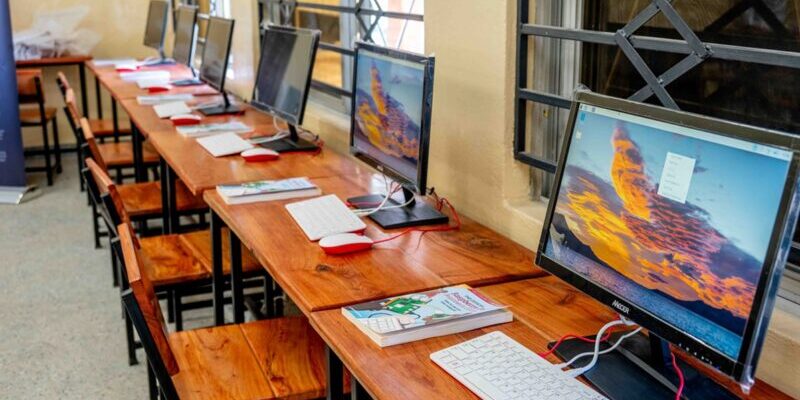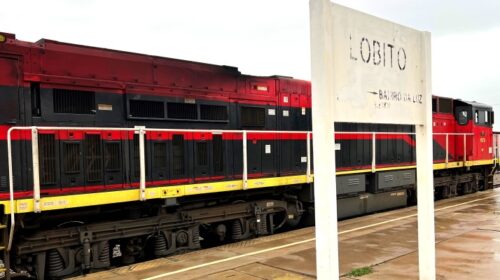Kagem & Gemfields Foundation Donate Solar-Powered Lab and Classroom to Kapila Primary School
Kagem Mining and Gemfields Foundation, the charitable arm of Kagem’s majority owner and operator – Gemfields, has handed over a newly constructed block with three classrooms and a fully equipped solar powered computer lab to Lufwanyama’s Kapila Primary School to enhance the quality of education in the area.
The project, completed at a cost of approximately ZMW 6.9 million (USD 316,000), puts Kapila Primary School among the handful of educational institutions in the area offering computer lessons to its pupils.
The ceremony was attended by local community members, pupils, school board members, senior members of local Zambian Government namely Lufwanyama’s District Commissioner, Mr Justin Mwalikwa, Lufwanyama’s Council Secretary Ms Linda Mapara and Lufwanyama’s Educational Board Secretary, Mr. Silvester Mukanda.
In representation of Kagem and Gemfields Group Mr. Sean Gilbertson, Gemfields CEO and Mr. CV Suresh, Kagem’s Managing Director, attended the event.
On behalf of Lufwanyama’s Member of Parliament Hon. Kenny Siachisumo, Mr Edward Kapandula stated that the government’s policy to introduce free education at primary and secondary levels has led to an increase in the number of pupils enrolled in schools across the country, including at Kapila Primary School, which has seen the student population rise from 201 to 342 over the past year.
“This increase in enrolment makes infrastructure like the extra classrooms block and computer lab built by Kagem and Gemfields Foundation more important. It is encouraging to see that the mineral wealth found in Lufwanyama is bringing benefits to surrounding communities,” he said.
Speaking at the same event, Lufwanyama’s District Commissioner, Mr Justin Mwalikwa described Kagem as a long-term partner in building modern infrastructure and enhancing service delivery in both the education and health sectors in the district.
“Kagem is one mining company that has taken educating the youth in the district to heart, with the company constructing and renovating schools, classrooms and staff houses in the past years at Chapula and Kapila communities, and it continues to support the centres throughout the school year,” said Mr Mwalikwa.
Gemfields Corporate Responsibility Director, Edward Johnson, explained, “Kagem’s job is to mine emeralds as efficiently as possible and bring the money back to Zambia. And when we do that we can employ more people and build more schools like this.”
In her keynote address, Kagem’s Head of Corporate Responsibility, Lomthunzi Mbewe, said that Kagem valued education, adding that the company believed that it was contributing to the development of future employees and leaders by supporting today’s learners.
The computer lab, which Ms Mbewe described as “Lufwanyama’s first step towards a digital future” runs on clean solar energy and has complete access to high-speed internet.
The installation of the solar panels at the school is an unprecedented development in the district and Kapila will also serve as an example of how green energy can help foster learning and development in the area.
Zambian Government representatives expressed their intention to roll out an e-learning management system, as per the guidance in the 2024 budget presentation by the Ministry of Finance, aimed at ensuring easy access to online teaching and learning materials across the country.
To December 2022, Kagem has spent ZMW 68.1 million (around USD 3 million) in corporate responsibility programmes across health, livelihoods and conservation, as well as educational initiatives in Chapula, Kapila, Masasa and other surrounding areas.
Last year, Kagem renewed its partnership with both the Copperbelt University (CBU) and the University of Zambia (UNZA), committing to new scholarship programmes totalling ZMW 7.83 million (USD 345,000), further underpinning its support for local education.
Furthermore, this September, Kagem signed a Memorandum of Understanding (MoU) with the Government of Zambia to fund the construction of the Chapula Vocational Training Centre in Lufwanyama which is estimated to cost ZMW 52.75 million (USD 2.5 million) and will enable local men and women to acquire vocational skills to improve their employability.
65 total views , 1 views today





